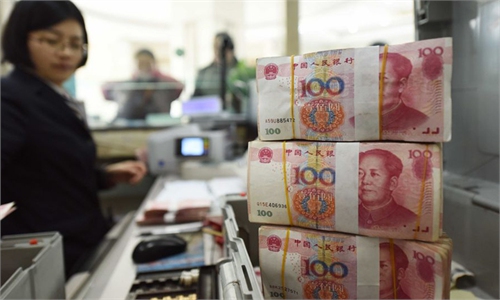China's newly added market entities continue to rise in Jan-Apr despite headwinds: SAMR

Employees work at the Molarray Biotechnology Co. at Suzhou Industrial Park in Suzhou, East China's Jiangsu Province, February 7, 2020. Photo: Xinhua
China's newly added market entities continued to be on the rise in the first four months of the year, an indication of the economy's strong resilience and potential, Xinhua reported on Sunday, citing an interview with Pu Chun, deputy head of the State Administration for Market Supervision (SAMR).
The top market regulator, according to Pu, is working with relevant government departments to research and draft guidelines on bolstering the development of self-employed people.
There were 158 million market entities in the country as of the end of April, an increase of 10.5 percent, laying a vigorous microeconomic groundwork for steadying the macroeconomy, Pu said.
In the first four months, the country added 8.99 million new market entities, up 0.7 percent year-on-year.
In specifics, the number of newly added firms hit 22,600 per day, still at relatively high levels, while the number of newly added self-employed people rose by 2.9 percent year-on-year to 6.24 million.
As the COVID-19 epidemic is effectively contained and the effects of pro-growth policies become evident, the country's market entities are expected to maintain high growth, according to Xinhua's report.
Currently, some market entities truly face new situations and hardships that beat previous estimates, but their self-adapting capacities are improving along with the country's ramped-up support policy, Pu said.
Pu revealed that the administration is joining hands with relevant authorities to draft guidelines for endorsing self-employed people.
In an interview on Sunday with Chinese news program, Xinwen Lianbo, Pu said that market regulatory bodies will focus on anti-pandemic supplies and major items essential for the livelihood of the people and make efforts to ensure supply, stabilize prices and crack down on unlawful activities such as hoarding and profiteering under the guise of virus prevention and containment.
Xinwen Lianbo is the country's top news program aired on a daily basis by the state broadcaster.
In another sign of robustness of the country's smaller businesses, an index measuring "little giant" firms categorized as specialized, refined and innovative in professional fields and core technologies, hit 198.02 as of April, an increase of 27.73 percent year-on-year, the state broadcaster reported Sunday, citing data from the China Center for Information Industry Development under the Ministry of Industry and Information Technology.
Sunday's report also highlighted that the country has stepped up the building of a modern infrastructure system spanning transportation, energy and water conservation.
The country's major water conservation projects under construction involve investment of more than 1 trillion yuan ($150 billion).
Moreover, the country has committed to develop new-generation supercomputing, cloud computing, artificial intelligent platforms and broadband network infrastructure since this year, with newly started projects hitting 25 with investment topping 190 billion yuan.
It is estimated that big data center investment would grow at an annual pace of over 20 percent during the 14th Five-year Plan (2021-25), with a total investment surpassing 3 trillion yuan ($450 billion), the report said.
In Q1 of 2022, the country's infrastructure investment jumped 8.5 percent from the year before, with a gain of 0.4 percentage points from the reading for January and February, official data showed.
Global Times



